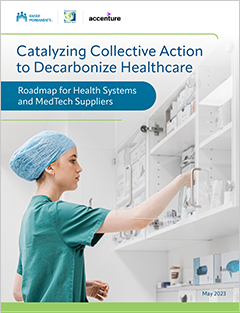The health sector must work collaboratively with health care suppliers to decarbonize the supply chain and build climate resilience for the entire value chain.
 “Catalyzing Collective Action to Decarbonize Healthcare: A Roadmap for Health Systems and MedTech Suppliers” was published in partnership with Kaiser Permanente, Accenture, Practice Greenhealth, and Health Care Without Harm. It consolidates feedback from a round table of health systems and their top suppliers, as well as group purchasing organizations, along with findings from additional subject matter experts and secondary research.
“Catalyzing Collective Action to Decarbonize Healthcare: A Roadmap for Health Systems and MedTech Suppliers” was published in partnership with Kaiser Permanente, Accenture, Practice Greenhealth, and Health Care Without Harm. It consolidates feedback from a round table of health systems and their top suppliers, as well as group purchasing organizations, along with findings from additional subject matter experts and secondary research.
Collaboration is needed to decarbonize the emissions from medical devices and supplies. This roadmap identifies collective actions and commitments that can form the basis for this cooperative work. Each collective action has been mapped to a 2-year timeline based on estimated ranges for execution. Several initiatives can be accomplished within the first 12-24 months, while others will lay the foundation for further decarbonization. Achieving these collective efforts will require:
Leadership: Leadership support is critical for enterprise-wide supply chain decarbonization initiatives. Leaders must provide resources to operationalize efforts, as well as the direction and incentives to ensure culture change.
Data access and transparency: Both health systems and suppliers require access to the right data at the right time to support decarbonization. There are currently two significant areas of challenge:
- Accurate emissions accounting: Accurate, product-level emissions are not currently available for most medical supplies and equipment. Many companies do not properly understand their emissions.
- Data standardization: Procurement professionals are often not getting data necessary to make sourcing decisions, and suppliers are getting inundated with a variety of data requests.
To mobilize collective action and provide a roadmap for near-term efforts to decarbonize the MedTech value chain, four key areas of focus have been identified to support decarbonization of the supply chain:
- renewable energy
- product Innovation
- product utilization and clinical engagement
- transportation and logistics
About this paper
Health Care Without Harm and Kaiser Permanente convened a roundtable of health systems and their top suppliers, as well as group purchasing organizations, to discuss how they might work together to address GHG emissions related to the health care value chain. The health systems represented hundreds of hospitals from across the country and the suppliers included medical device, equipment, service, and distribution (MedTech) companies, representing over $1 trillion in annual revenue. The convening grew out of initial work on supply chain decarbonization done by the U.S. Health Care Climate Council and MedTech supplier partners.
